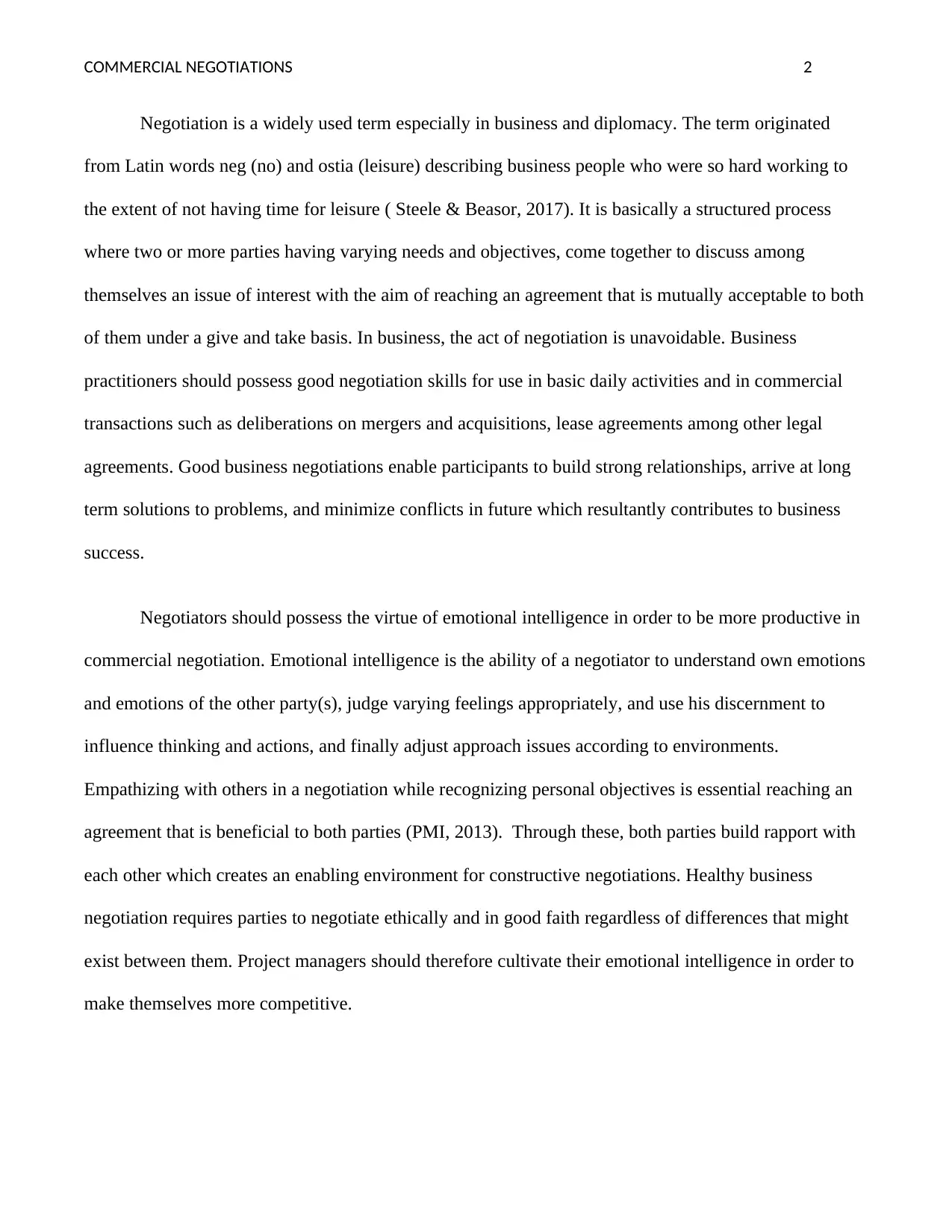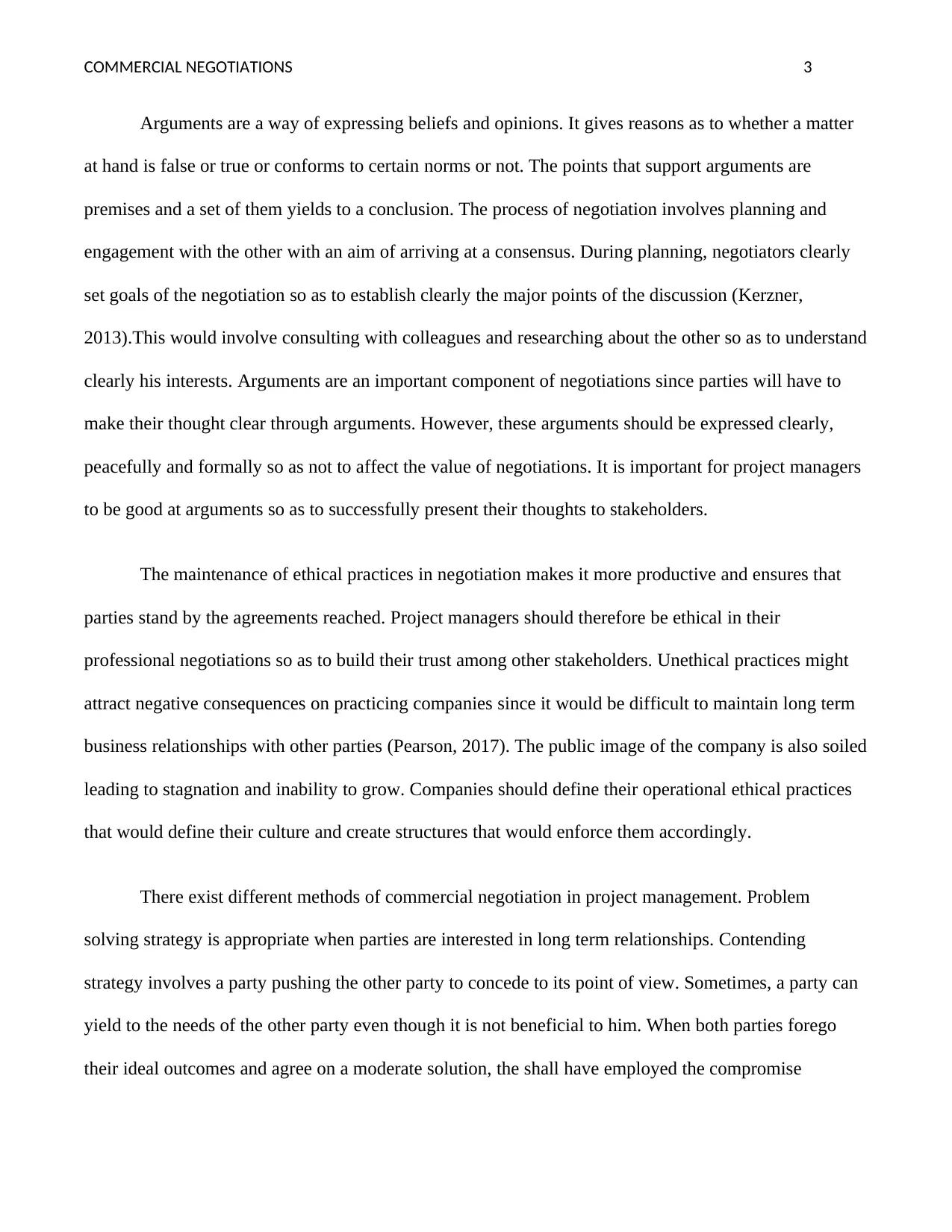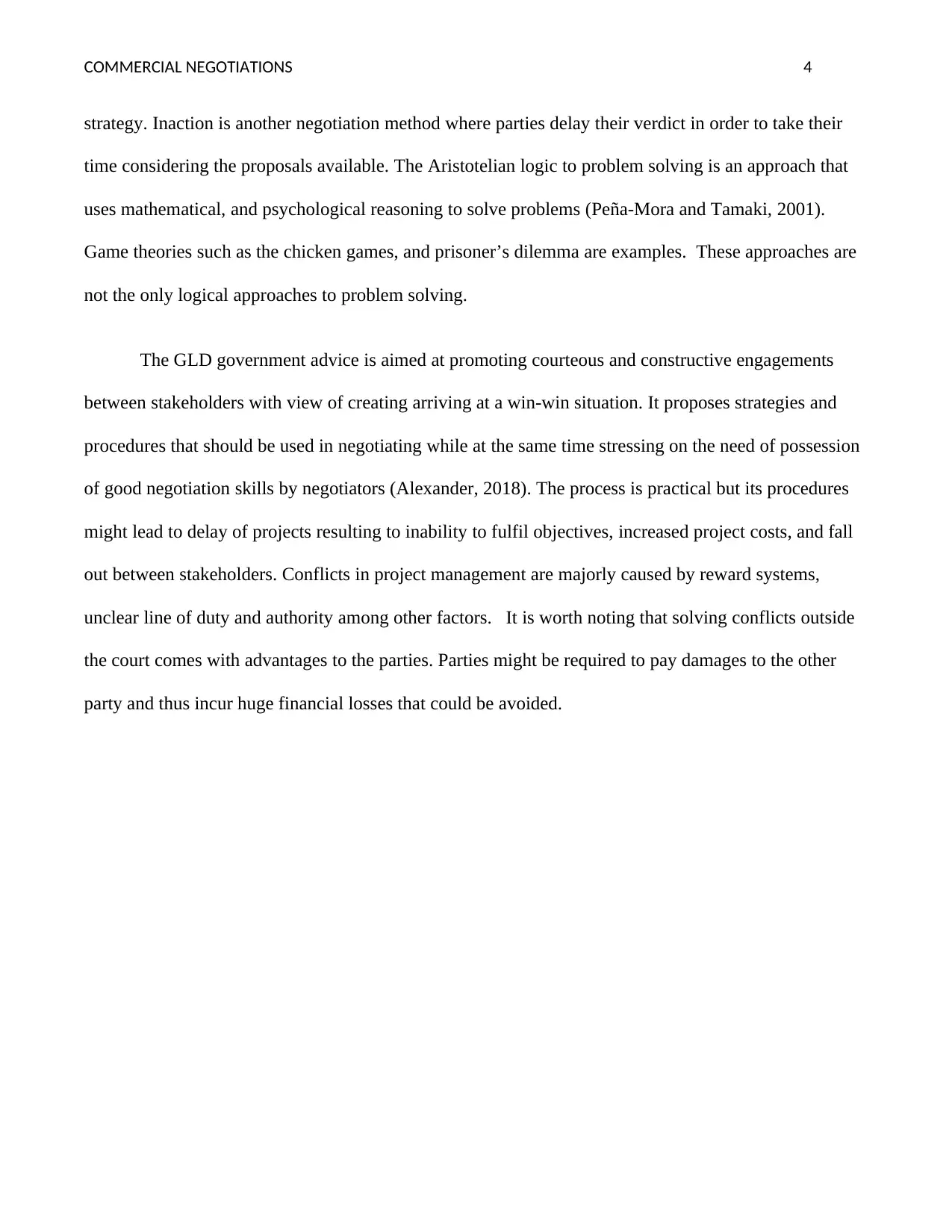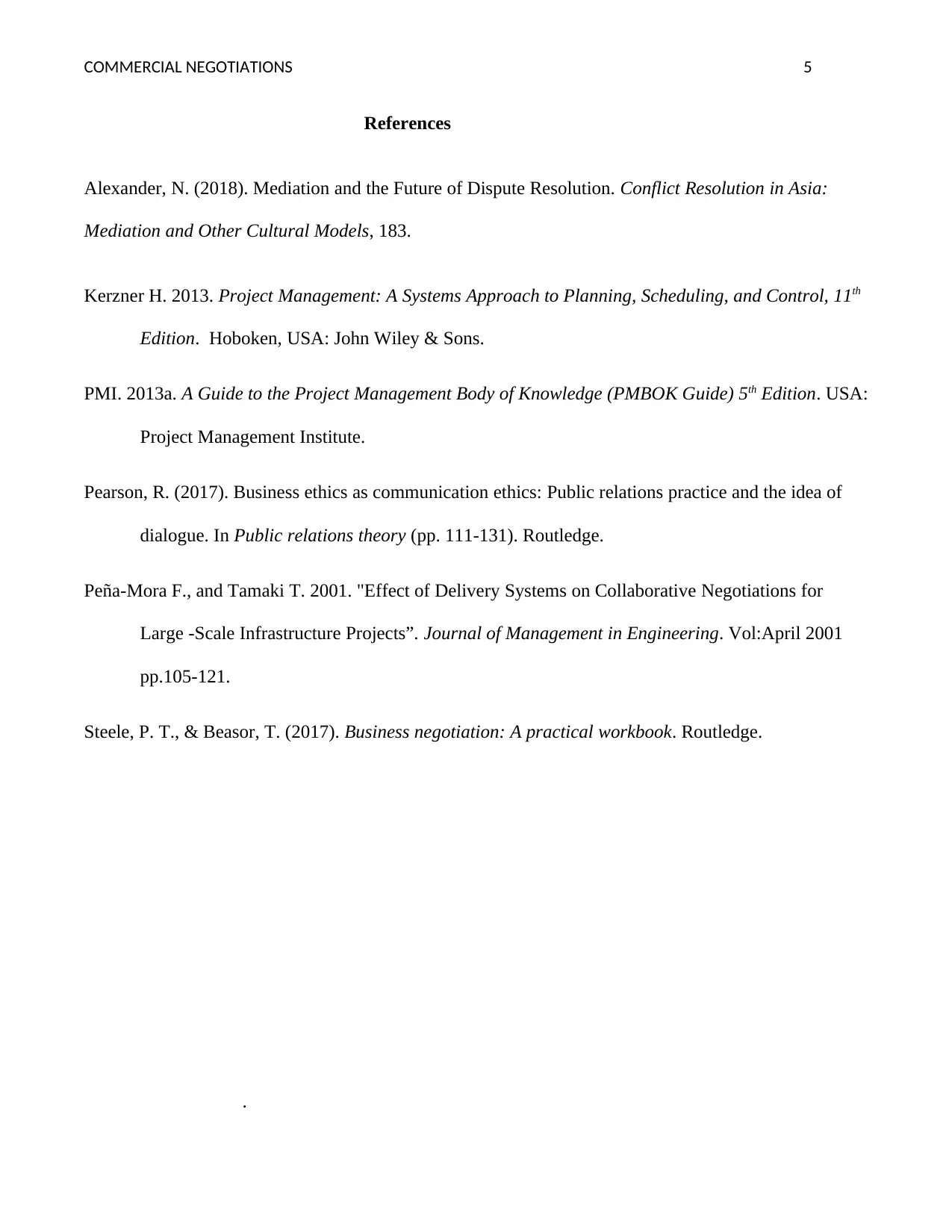PPMP20011: Commercial Project Negotiation for Project Managers
VerifiedAdded on 2023/06/12
|6
|1123
|472
Essay
AI Summary
This essay delves into the critical aspects of commercial negotiations within project management, highlighting the importance of emotional intelligence, ethical practices, and various negotiation methods. It discusses how arguments play a role in negotiations and stresses the need for clear and peaceful communication. The essay also examines different negotiation strategies, such as problem-solving, contending, and compromise, and touches upon the Aristotelian logic and GLD government advice for effective stakeholder engagement. Furthermore, it addresses the causes of conflicts in project management and the advantages of resolving them outside of court, emphasizing the potential financial losses from litigation. The paper uses examples and references to support its claims, providing a comprehensive overview of commercial negotiation in project management.

Running head: COMMERCIAL NEGOTIATIONS 1
Commercial Negotiations
Student’s name
Institutional Affiliation
Course name
Date
Commercial Negotiations
Student’s name
Institutional Affiliation
Course name
Date
Paraphrase This Document
Need a fresh take? Get an instant paraphrase of this document with our AI Paraphraser

COMMERCIAL NEGOTIATIONS 2
Negotiation is a widely used term especially in business and diplomacy. The term originated
from Latin words neg (no) and ostia (leisure) describing business people who were so hard working to
the extent of not having time for leisure ( Steele & Beasor, 2017). It is basically a structured process
where two or more parties having varying needs and objectives, come together to discuss among
themselves an issue of interest with the aim of reaching an agreement that is mutually acceptable to both
of them under a give and take basis. In business, the act of negotiation is unavoidable. Business
practitioners should possess good negotiation skills for use in basic daily activities and in commercial
transactions such as deliberations on mergers and acquisitions, lease agreements among other legal
agreements. Good business negotiations enable participants to build strong relationships, arrive at long
term solutions to problems, and minimize conflicts in future which resultantly contributes to business
success.
Negotiators should possess the virtue of emotional intelligence in order to be more productive in
commercial negotiation. Emotional intelligence is the ability of a negotiator to understand own emotions
and emotions of the other party(s), judge varying feelings appropriately, and use his discernment to
influence thinking and actions, and finally adjust approach issues according to environments.
Empathizing with others in a negotiation while recognizing personal objectives is essential reaching an
agreement that is beneficial to both parties (PMI, 2013). Through these, both parties build rapport with
each other which creates an enabling environment for constructive negotiations. Healthy business
negotiation requires parties to negotiate ethically and in good faith regardless of differences that might
exist between them. Project managers should therefore cultivate their emotional intelligence in order to
make themselves more competitive.
Negotiation is a widely used term especially in business and diplomacy. The term originated
from Latin words neg (no) and ostia (leisure) describing business people who were so hard working to
the extent of not having time for leisure ( Steele & Beasor, 2017). It is basically a structured process
where two or more parties having varying needs and objectives, come together to discuss among
themselves an issue of interest with the aim of reaching an agreement that is mutually acceptable to both
of them under a give and take basis. In business, the act of negotiation is unavoidable. Business
practitioners should possess good negotiation skills for use in basic daily activities and in commercial
transactions such as deliberations on mergers and acquisitions, lease agreements among other legal
agreements. Good business negotiations enable participants to build strong relationships, arrive at long
term solutions to problems, and minimize conflicts in future which resultantly contributes to business
success.
Negotiators should possess the virtue of emotional intelligence in order to be more productive in
commercial negotiation. Emotional intelligence is the ability of a negotiator to understand own emotions
and emotions of the other party(s), judge varying feelings appropriately, and use his discernment to
influence thinking and actions, and finally adjust approach issues according to environments.
Empathizing with others in a negotiation while recognizing personal objectives is essential reaching an
agreement that is beneficial to both parties (PMI, 2013). Through these, both parties build rapport with
each other which creates an enabling environment for constructive negotiations. Healthy business
negotiation requires parties to negotiate ethically and in good faith regardless of differences that might
exist between them. Project managers should therefore cultivate their emotional intelligence in order to
make themselves more competitive.

COMMERCIAL NEGOTIATIONS 3
Arguments are a way of expressing beliefs and opinions. It gives reasons as to whether a matter
at hand is false or true or conforms to certain norms or not. The points that support arguments are
premises and a set of them yields to a conclusion. The process of negotiation involves planning and
engagement with the other with an aim of arriving at a consensus. During planning, negotiators clearly
set goals of the negotiation so as to establish clearly the major points of the discussion (Kerzner,
2013).This would involve consulting with colleagues and researching about the other so as to understand
clearly his interests. Arguments are an important component of negotiations since parties will have to
make their thought clear through arguments. However, these arguments should be expressed clearly,
peacefully and formally so as not to affect the value of negotiations. It is important for project managers
to be good at arguments so as to successfully present their thoughts to stakeholders.
The maintenance of ethical practices in negotiation makes it more productive and ensures that
parties stand by the agreements reached. Project managers should therefore be ethical in their
professional negotiations so as to build their trust among other stakeholders. Unethical practices might
attract negative consequences on practicing companies since it would be difficult to maintain long term
business relationships with other parties (Pearson, 2017). The public image of the company is also soiled
leading to stagnation and inability to grow. Companies should define their operational ethical practices
that would define their culture and create structures that would enforce them accordingly.
There exist different methods of commercial negotiation in project management. Problem
solving strategy is appropriate when parties are interested in long term relationships. Contending
strategy involves a party pushing the other party to concede to its point of view. Sometimes, a party can
yield to the needs of the other party even though it is not beneficial to him. When both parties forego
their ideal outcomes and agree on a moderate solution, the shall have employed the compromise
Arguments are a way of expressing beliefs and opinions. It gives reasons as to whether a matter
at hand is false or true or conforms to certain norms or not. The points that support arguments are
premises and a set of them yields to a conclusion. The process of negotiation involves planning and
engagement with the other with an aim of arriving at a consensus. During planning, negotiators clearly
set goals of the negotiation so as to establish clearly the major points of the discussion (Kerzner,
2013).This would involve consulting with colleagues and researching about the other so as to understand
clearly his interests. Arguments are an important component of negotiations since parties will have to
make their thought clear through arguments. However, these arguments should be expressed clearly,
peacefully and formally so as not to affect the value of negotiations. It is important for project managers
to be good at arguments so as to successfully present their thoughts to stakeholders.
The maintenance of ethical practices in negotiation makes it more productive and ensures that
parties stand by the agreements reached. Project managers should therefore be ethical in their
professional negotiations so as to build their trust among other stakeholders. Unethical practices might
attract negative consequences on practicing companies since it would be difficult to maintain long term
business relationships with other parties (Pearson, 2017). The public image of the company is also soiled
leading to stagnation and inability to grow. Companies should define their operational ethical practices
that would define their culture and create structures that would enforce them accordingly.
There exist different methods of commercial negotiation in project management. Problem
solving strategy is appropriate when parties are interested in long term relationships. Contending
strategy involves a party pushing the other party to concede to its point of view. Sometimes, a party can
yield to the needs of the other party even though it is not beneficial to him. When both parties forego
their ideal outcomes and agree on a moderate solution, the shall have employed the compromise
⊘ This is a preview!⊘
Do you want full access?
Subscribe today to unlock all pages.

Trusted by 1+ million students worldwide

COMMERCIAL NEGOTIATIONS 4
strategy. Inaction is another negotiation method where parties delay their verdict in order to take their
time considering the proposals available. The Aristotelian logic to problem solving is an approach that
uses mathematical, and psychological reasoning to solve problems (Peña-Mora and Tamaki, 2001).
Game theories such as the chicken games, and prisoner’s dilemma are examples. These approaches are
not the only logical approaches to problem solving.
The GLD government advice is aimed at promoting courteous and constructive engagements
between stakeholders with view of creating arriving at a win-win situation. It proposes strategies and
procedures that should be used in negotiating while at the same time stressing on the need of possession
of good negotiation skills by negotiators (Alexander, 2018). The process is practical but its procedures
might lead to delay of projects resulting to inability to fulfil objectives, increased project costs, and fall
out between stakeholders. Conflicts in project management are majorly caused by reward systems,
unclear line of duty and authority among other factors. It is worth noting that solving conflicts outside
the court comes with advantages to the parties. Parties might be required to pay damages to the other
party and thus incur huge financial losses that could be avoided.
strategy. Inaction is another negotiation method where parties delay their verdict in order to take their
time considering the proposals available. The Aristotelian logic to problem solving is an approach that
uses mathematical, and psychological reasoning to solve problems (Peña-Mora and Tamaki, 2001).
Game theories such as the chicken games, and prisoner’s dilemma are examples. These approaches are
not the only logical approaches to problem solving.
The GLD government advice is aimed at promoting courteous and constructive engagements
between stakeholders with view of creating arriving at a win-win situation. It proposes strategies and
procedures that should be used in negotiating while at the same time stressing on the need of possession
of good negotiation skills by negotiators (Alexander, 2018). The process is practical but its procedures
might lead to delay of projects resulting to inability to fulfil objectives, increased project costs, and fall
out between stakeholders. Conflicts in project management are majorly caused by reward systems,
unclear line of duty and authority among other factors. It is worth noting that solving conflicts outside
the court comes with advantages to the parties. Parties might be required to pay damages to the other
party and thus incur huge financial losses that could be avoided.
Paraphrase This Document
Need a fresh take? Get an instant paraphrase of this document with our AI Paraphraser

COMMERCIAL NEGOTIATIONS 5
References
Alexander, N. (2018). Mediation and the Future of Dispute Resolution. Conflict Resolution in Asia:
Mediation and Other Cultural Models, 183.
Kerzner H. 2013. Project Management: A Systems Approach to Planning, Scheduling, and Control, 11th
Edition. Hoboken, USA: John Wiley & Sons.
PMI. 2013a. A Guide to the Project Management Body of Knowledge (PMBOK Guide) 5th Edition. USA:
Project Management Institute.
Pearson, R. (2017). Business ethics as communication ethics: Public relations practice and the idea of
dialogue. In Public relations theory (pp. 111-131). Routledge.
Peña-Mora F., and Tamaki T. 2001. "Effect of Delivery Systems on Collaborative Negotiations for
Large -Scale Infrastructure Projects”. Journal of Management in Engineering. Vol:April 2001
pp.105-121.
Steele, P. T., & Beasor, T. (2017). Business negotiation: A practical workbook. Routledge.
.
References
Alexander, N. (2018). Mediation and the Future of Dispute Resolution. Conflict Resolution in Asia:
Mediation and Other Cultural Models, 183.
Kerzner H. 2013. Project Management: A Systems Approach to Planning, Scheduling, and Control, 11th
Edition. Hoboken, USA: John Wiley & Sons.
PMI. 2013a. A Guide to the Project Management Body of Knowledge (PMBOK Guide) 5th Edition. USA:
Project Management Institute.
Pearson, R. (2017). Business ethics as communication ethics: Public relations practice and the idea of
dialogue. In Public relations theory (pp. 111-131). Routledge.
Peña-Mora F., and Tamaki T. 2001. "Effect of Delivery Systems on Collaborative Negotiations for
Large -Scale Infrastructure Projects”. Journal of Management in Engineering. Vol:April 2001
pp.105-121.
Steele, P. T., & Beasor, T. (2017). Business negotiation: A practical workbook. Routledge.
.

COMMERCIAL NEGOTIATIONS 6
⊘ This is a preview!⊘
Do you want full access?
Subscribe today to unlock all pages.

Trusted by 1+ million students worldwide
1 out of 6
Related Documents
Your All-in-One AI-Powered Toolkit for Academic Success.
+13062052269
info@desklib.com
Available 24*7 on WhatsApp / Email
![[object Object]](/_next/static/media/star-bottom.7253800d.svg)
Unlock your academic potential
Copyright © 2020–2026 A2Z Services. All Rights Reserved. Developed and managed by ZUCOL.





